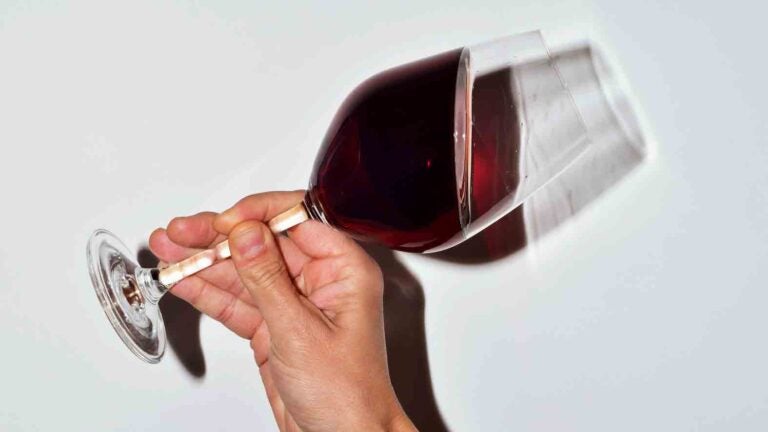
Consuming around one drink a day can have positive effects on your health, according to experts. (Photo/Stocksy)
Yes, it’s true: Wine is good for you — to a point
A glass or two has its benefits, such as reducing the risk of stroke and heart disease — provided you don’t overindulge. And most of us underestimate how much we drink
The Mediterranean diet has become synonymous with healthy eating, but there’s one thing in it that stands out: Wine is good for you.
Although drinking excessively will essentially kill any benefits of alcohol, mild to moderate drinking is shown to have overall health benefits, according to a 2017 study published in the American College of Cardiology.
“This study gave the green light that moderate drinking is good,” said Sharon Orrange, a clinical associate professor of medicine at the Keck School of Medicine of USC and a practicing physician at the Keck Medicine of USC Beverly Hills facility.
Not only does alcohol decrease the risk of stroke and heart disease, but it also diminishes risk for all causes of death, according to Orrange.
While many see wine as the healthy choice, noting its antioxidant power, research shows benefits of alcohol are pretty equal across the board – whether it’s a shot of liquor, a glass of wine or a bottle of beer. Also, the antioxidants in wine can be overrated.
Antioxidants in wine are so low that it’s a joke.
Daryl Davies
“Antioxidants in wine are so low that it’s a joke,” according to Professor Daryl Davies, a USC neuro-pharmacologist who researches alcohol and drugs of abuse.
While red wine does have antioxidants like resveratrol, which it carries primarily from the grape skins, the amount in a glass isn’t enough to do anything, Davies said. You would have to drink a lot of wine to get a lot of resveratrol, canceling out the benefits.
Red or white?
When it comes to white wine or red wine, it’s not just a personal choice. Red wine tends to have more sulfites, a preservative in wine, and that can irritate folks who suffer from asthma or migraines, Orrange said. They might be better off with a glass of white.
There’s one big “but” that comes into play when talking about the benefits of booze, however: You have to be realistic about how much you’re drinking.
“I think we all underestimate our intake,” Orrange said. “It’s seven drinks a week for women. Men can have two drinks a night.”
And that’s a 5-ounce pour of wine, a 12-ounce beer or 1.5 ounces of 80-proof alcohol — perhaps less generous than you pour in the comfort of your kitchen.
Cutting back to only one drink a day can be tough for some of her patients, who sometimes enjoy a couple of glasses of wine with dinner.
“I tell them pick two to three nights during the week — say Monday, Tuesday, Thursday — that I’m not going to drink at all,” she said.
Besides overall health, one of the main reasons Orrange is getting folks to cut back is insomnia.
I would say alcohol is the most commonly used over-the-counter sleep aid.
Sharon Orrange
“I have the discussion about insomnia 15 times a week, three times a day — at least,” she said. “I would say alcohol is the most commonly used over-the-counter sleep aid.”
Many of her patients use a glass of wine to ease into slumber. While it might help them fall asleep, it disrupts the last half of their sleep cycle, diminishing the quality of their sleep, she said.
Benefits versus Alzheimer’s
There are some ways wine stands out, however. A Swedish study that spanned 34 years found that wine protected women against developing Alzheimer’s disease, especially when their only alcohol was wine. It’s unclear why, but researchers opined that it could be due to the higher ethanol in wine or to a generally healthier lifestyle adopted by wine drinkers.
When it comes to why drinking wine and other alcohol can be beneficial, it’s hard to say, Davies said. And keep in mind, these benefits are only possible when alcohol is consumed in moderation. If one overdrinks or binge-drinks, alcohol can have the opposite effect, leading to neurological and memory-related disorders, certain forms of cancer, heart disease and pronounced effects on the liver, Davies said.
Genetics are a component as well. Some folks live to age 100, drinking and smoking every day. There’s some evidence that people with a history of cancer in their families should avoid alcohol, but “we’ve got a long way to go before that science is conclusive,” he said.
Alcohol has a positive impact on high blood pressure and stress, two big health culprits, Davies said, which could be why it’s beneficial beyond just cardiovascular health.
When it comes to the benefits of booze, the reason might be simple, he said: Alcohol is an anxiolytic, meaning it reduces anxiety. Getting in the habit of relaxing and unwinding — with a glass of wine — is good for you.



